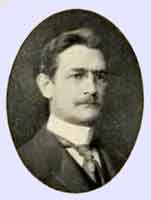|
|
Charles Lane Poor (January 18, 1866 – September 27, 1951)[1][2] was born in Hackensack, New Jersey, the son of Edward Erie Poor. He graduated from the City College of New York and received a Ph.D. in 1892 from Johns Hopkins University. Poor became an American astronomer and professor of celestial mechanics at Columbia University from 1903 to 1944, when he was named Professor Emeritus. He published a monograph disputing the evidence for Einstein's theory of relativity in the pre-war years before the theory became firmly established.[3][4] CL Poor published a series of papers (see bibliography) that reflect his lack of understanding for the theory of relativity. For 25 years, Poor was chairman of the admissions committee of the New York Yacht Club. In addition, he was a fellow of the Royal Astronomical Society and an associate fellow of the American Academy of Arts and Sciences. He served several terms as mayor of Dering Harbor on Long Island, New York, and invented a "line of position computers" for yachting navigation. At Columbia University, Poor was a teacher of the astronomer Samuel A. Mitchell, who went on to become director of the Leander McCormick Observatory at the University of Virginia.[5] Poor's son, Edmund Ward Poor, was one of ten co-founders of Grumman Aircraft on Long Island. References 1. ^ Obituary, Monthly Notices of the Royal Astronomical Society, V112, p. 279 (1952).
* Is Einstein Wrong? A Debate (Jun. 1924) Retrieved from "http://en.wikipedia.org/"
|
|

